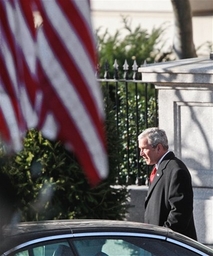WASHINGTON – President George W. Bush's farewell speech is more than a goodbye to the nation that elected him twice. It is his last chance in office to define his tumultuous(动荡的) presidency(总统任期) in his own, unfiltered terms — a mission that will keep his fire burning even after he fades off to a quieter life.
Bush will say goodbye to the country Thursday night. He will follow the script of Presidents Bill Clinton and Ronald Reagan and Jimmy Carter and many before them: Express thanks to the country and pride in the honor of serving, wish the next president well and outline what he considers to be the biggest challenges ahead.
And there will be looking back.
For presidents, parting thoughts are not about parting shots. This will be no different. But Bush is proud of his record and will go out defending it.
In that sense, the goodbye address will underscore the competing accounts of his presidency one last time.
Bush and his loyal backers see his record this way: He kept the country safe from attack after terrorism redefined his presidency, cut taxes, freed the people of Afghanistan and Iraq, reformed education, oversaw 52 straight months of job growth, acted decisively when the economy tanked, stuck to principle no matter what his poll numbers, retooled(重组) the military and improved federal crisis management after the worst U.S. natural disaster happened on his watch.
To his critics, Bush wasted the world's good will after the Sept. 11 attacks, got the nation into a catastrophic(悲惨的, 灾难的) and avoidable Iraq war, presided over(负责, 主持) a staggering(惊人的) 2.6 million jobs lost in 2008, ran up debt, reacted slowly to Hurricane Katrina, did more dividing than uniting and refused to listen to the will of the people.
Historians say the fairest assessment will come over time. Bush says accurate short-term history does not even exist.
"I don't think you can possibly get the full breadth of an administration until time has passed," Bush said in his final news conference this week.
Yet this much is also clear: The president does care about how the country views his time in office. Right now.
In essence, he has been giving legacy addresses for weeks. He has held separate events to defend his record on protecting the country, helping veterans, promoting volunteerism, appointing judges, expanding trade, reshaping the military, overhauling(革新) education and fighting AIDS in impoverished lands.
On its Web site, the White House has even gone so far as to post "100 things Americans may not know about the Bush administration record."
The final speech, running 12 to 15 minutes, will be at 8 p.m. EST Thursday. Bush will deliver it from the East Room of the White House, where the audience will include a few dozen people chosen for their personal stories, a practice normally reserved for a State of the Union address.
Bush has been much more reflective in the twilight of his presidency. That tone will probably emerge in his speech, just as it did for his predecessors.
Clinton said in his farewell, "I'll leave the presidency more idealistic, more full of hope than the day I arrived and more confident than ever that America's best days lie ahead."
Ronald Reagan invoked images of the shining city on the hill: "We made the city stronger. We made the city freer, and we left her in good hands. All in all, not bad, not bad at all."
And Jimmy Carter told the nation, "From the bottom of my heart, I want to express to you the gratitude I feel."
Not among that group? Bush's father, President George H.W. Bush. He never gave an official farewell address.
But he can give his son advice on what comes next. After these final few days in office, and Barack Obama's inauguration Tuesday, real life returns. Or as real as it can be for Bush, who will still be a president for life and remain one of the most recognizable figures on the planet.
In a collection of his own writings, the former President Bush included this description of his immediate post-presidency life with his wife: "I am the dish washer. I rinse the plates and put them in the washer. Almost simultaneously I load our coffee machine. And then we walk the dogs."
The current president can almost feel it. No more security briefings virtually every morning. He is picturing getting up and making his wife coffee.
"You just fade out," Bush told reporters from Texas newspapers last week. "That's fine with me. The faster the fade, the better."
Life after the White House will find Bush in two homes — his beloved ranch in Crawford, Texas, and the new home that first lady Laura Bush picked for them in an affluent Dallas neighborhood.
At 62, Bush is younger after two terms as president than his father was before he got started in the presidency. He says he plans to be "fairly footloose(自由自在的) for a while" but admits he would get antsy(坐立不安的) without structure and activity.
One project: Bush plans to write a book. He says it will probably focus on the toughest decisions he made, emphasizing what he considers to be the forgotten context of the times, especially right after Sept. 11, 2001.
He will also have a three-part presidential center at Southern Methodist University: a library of artifacts of the Bush administration, a museum and an independent policy institute designed to promote freedom and key initiatives of his presidency, like efforts to combat AIDS and malaria.
"My sense is he feels misunderstood, and he's going to try to explain himself," said University of Texas scholar Bruce Buchanan. "He says he looks forward to being out of the klieg lights, and I believe that. But I don't believe he's content to wait until he's dust to see other opinions about him come to light."


